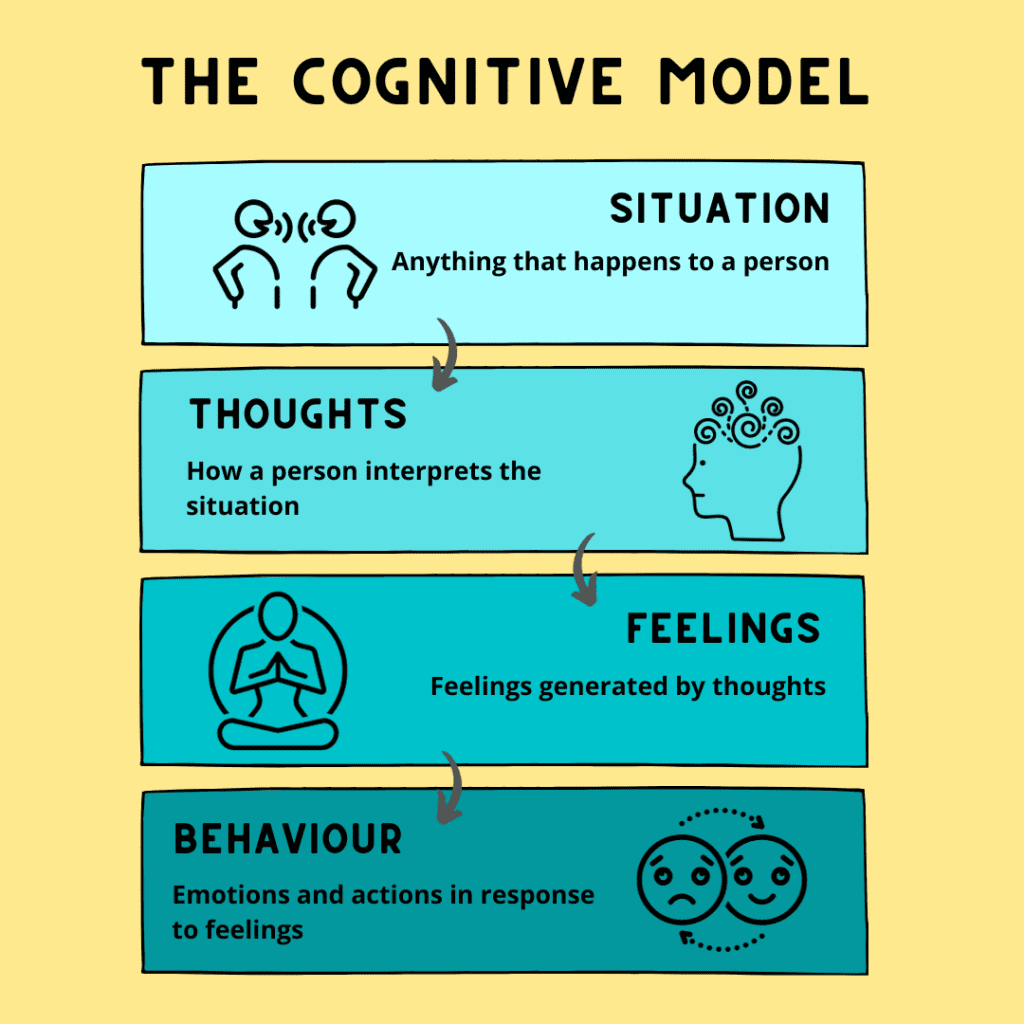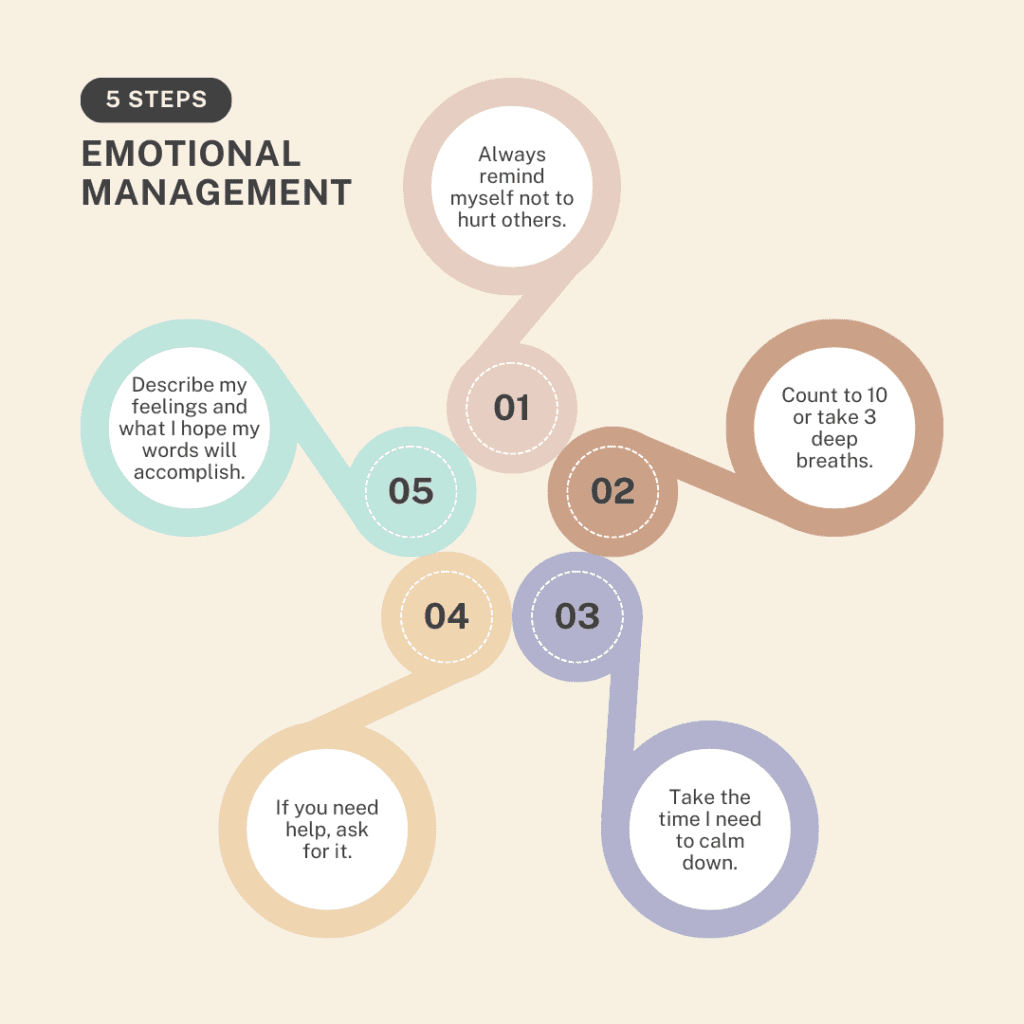
Intro
Are you tired of feeling stuck in negative thought patterns and behaviors? Do you want to make lasting changes in your life but don’t know where to start? It may be time to consider Cognitive Behavioral Therapy, or CBT. This evidence-based approach has been proven to be effective in treating a variety of mental health issues and can also be used to enhance overall well-being.
In this blog post, we will explore 6 ways that CBT can improve your life and help you reach your full potential. So let’s dive into the power of Cognitive Behavioral Therapy and discover how it can boost your quality of life.

Combatting Anxiety and Depression
In today’s world, the shadows of anxiety and depression loom large, silently affecting millions of individuals worldwide. But there’s a beacon of hope – Cognitive Behavioral Therapy (CBT). Highly regarded as a preferred method of treatment for these challenging conditions, CBT focuses on altering attitudes and behaviors by examining closely held thoughts, beliefs, and attitudes and their connection to our actions. By exploring this link, we can begin to understand the root of our anxieties and depressions.
Under the expert guidance of a Cognitive Behavioral Therapy (CBT) therapist, you can embark on a journey of self-discovery, where you learn to recognize your unique negative thought patterns. But this therapy is not just about identifying these patterns – it’s about learning to challenge them effectively. This process of cognitive restructuring can equip you with the tools you need to react differently to stressors, replacing negative thought spirals with a more positive and constructive mindset.
Whether you are facing common everyday worries or larger, more daunting hurdles, Cognitive Behavioral Therapy can provide you with alternative perspectives, aiding you in reframing life’s challenges in a healthier way. This newfound positivity can help break the shackles of anxiety and depression, offering you a brighter outlook on life.
CBT is not a quick fix, but rather a process that takes time, effort, and commitment. But with persistence and the right guidance, this powerful therapy can lead to profound improvements in your mental wellbeing, helping to lighten the heavy burden of anxiety and depression. In the end, the most important takeaway from Cognitive Behavioral Therapy is the ability to independently apply learned strategies in daily life, beyond the confines of the therapy room. This, in turn, empowers you to take control of your emotional wellbeing and steer the course of your life towards positivity and mental resilience.

Promoting Better Sleep Habits
Tossing and turning at night, a racing mind keeping you from peaceful slumber – sounds familiar? This is the reality for many individuals suffering from insomnia, whether it’s a standalone sleep disorder or a symptom tied to other mental health conditions. Fear not, as Cognitive Behavioral Therapy for Insomnia (CBT-I) is here to help.
CBT-I is specifically designed to target the behaviors and beliefs obstructing you from achieving restful sleep. This type of therapy helps uncover the culprits of your sleepless nights – the unhealthy habits and misconceptions about sleep that you may not even be aware of. The objective of CBT-I is to replace these detrimental habits with practices conducive to better sleep.
A critical part of this therapy is creating a sleep schedule that works for you. Regularity in when you go to bed and wake up can help regulate your body’s internal clock, resulting in more natural sleep patterns. Another significant aspect of CBT-I is managing those pesky nighttime thoughts. We all know how a simple worry can spiral into an hour-long internal dialogue when you’re trying to fall asleep. CBT-I provides you with strategies to deal with these racing thoughts, helping you to create a peaceful mental environment that encourages sleep.
Remember, the goal is not just about getting more hours of sleep, but about improving the quality of that sleep. And that’s where CBT-I really shines. By honing in on the root causes of your insomnia, CBT-I provides a structured approach to promote healthier sleep habits, allowing you to wake up feeling refreshed and rejuvenated, ready to take on the world. So, say goodbye to counting sheep and embrace the power of CBT-I to help guide you towards a path of better sleep habits.

Enhancing Emotional Regulation
Feeling as though you’re on an emotional roller coaster can be draining, to say the least. Overreactions to minor stressors or struggling to recover from emotional setbacks can indicate difficulties with emotional regulation. The beauty of Cognitive Behavioral Therapy (CBT) is that it can assist you in managing these emotional ups and downs with grace and resilience.
CBT emphasizes the importance of understanding and modifying our internal dialogue – that ongoing conversation we have with ourselves. The key here is to identify the early signs of an emotional response and pay attention to what’s happening within us. With Cognitive Behavioral Therapy, you can learn to observe and analyze your emotional reactions, noticing what triggers them and how they evolve.
But it doesn’t stop there. CBT also arms you with techniques to remain grounded during emotionally charged moments. Practicing mindfulness is one such technique that encourages you to stay present-focused and accept your feelings without judgment. This can significantly lessen the intensity of your emotional reactions and help you regain control more quickly.
Now, here’s where things get interesting. Emotional reactions are often fueled by our automatic thoughts – those spontaneous beliefs and assumptions that pop into our heads. These thoughts are frequently skewed towards negativity, stoking the fire of our emotional responses. However, with CBT, you learn to challenge these automatic thoughts, replacing them with more rational and balanced alternatives. This cognitive triad – altering negative thoughts, modifying behaviors, and improving mood – forms the cornerstone of Cognitive Behavioral Therapy.
But remember, change doesn’t occur overnight. Emotional regulation is a skill that needs to be honed with consistent practice. Just like building physical strength at the gym, training your emotional muscles will take time, patience, and dedication. But the payoff – a life less ruled by emotional chaos – is undoubtedly worth the effort. With CBT as your guide, you’re on your way to an emotionally healthier you. And this isn’t just about surviving those emotional storms; it’s about learning to navigate them with confidence, resilience, and grace.

Strengthening Self-Esteem and Confidence
Ever feel like you’re your own worst enemy? Are you often haunted by thoughts of not being good enough or capable enough? Well, you’re not alone. Many people grapple with these feelings of low self-esteem and lack of confidence, which can, unfortunately, act as an invisible barrier preventing you from realizing your true potential. The good news is that Cognitive Behavioral Therapy (CBT) can provide a helping hand in conquering this invisible foe.
CBT is like a mirror – it allows you to clearly see and understand the detrimental self-beliefs that you harbor. These could be deeply entrenched notions about your worth, abilities, or likability that are negative and far from the truth. However, the magic of CBT doesn’t just lie in the identification of these self-defeating beliefs but in actively challenging them.
Under the tutelage of a skilled CBT therapist, you’ll learn to question these beliefs, dissecting their origins and validity. This introspection can lead to the realization that many of these self-beliefs are not factual but based on flawed perceptions, past experiences, or external influences.
CBT encourages a shift from these inaccurate self-perceptions towards a more balanced and positive view of oneself. This involves replacing harsh self-criticism with compassion, self-doubt with self-belief, and fear of failure with the courage to try. As you learn to dispute your negative self-beliefs and replace them with more constructive ones, you’ll notice a gradual boost in your self-esteem and confidence.
This newfound confidence won’t just be a fleeting feeling but a robust sense of self-worth rooted in reality, not self-deprecation. And the ripple effect of this can touch all corners of your life. It can empower you to take more chances, stand up for yourself, express your needs assertively, and build more fulfilling relationships. In essence, it can transform your life in ways you never thought possible.
With CBT, the power to rewrite your self-narrative lies within your hands. And remember, the path to self-confidence is not a sprint but a marathon that requires time, patience, and resilience. But with every step you take in this journey, you’ll be one step closer to a more confident and self-assured you.

Enhancing Problem-Solving Skills
Navigating life’s journey can sometimes feel like an intricate maze filled with perplexing problems and dead-ends. Whether it’s a relationship issue, a work-related conundrum, or a personal challenge, life has a way of throwing curveballs at us. These hurdles can leave us feeling overwhelmed and stuck, trapped in a cycle of unproductive thinking. But fret not, for Cognitive Behavioral Therapy (CBT) is here to light the way, offering a clear path to better problem-solving skills.
Cognitive Behavioral Therapy provides a structured approach to tackle challenges, empowering you to view problems not as insurmountable obstacles but as opportunities for growth. The first step on this journey is to understand the nature of the problem. With CBT, you’ll learn to clearly define the issue at hand, breaking it down into manageable chunks. This process can provide valuable clarity, preventing you from being swayed by emotional biases or irrelevant details.
Next comes the brainstorming phase, where you’ll be encouraged to think creatively and conjure up a range of potential solutions. This is an opportunity to let your imagination soar, considering all possibilities, however unconventional they might seem. The focus here is not on the feasibility of the solutions but on the act of generating ideas.
Once you have a roster of potential solutions, it’s time to put on your analyst hat. Cognitive Behavioral Therapy guides you through the process of evaluating these solutions, assessing their pros and cons, and gauging their potential effectiveness. This analytical approach can help dispel the clouds of uncertainty, enabling you to make informed decisions.
The final step is putting the chosen solution into action and observing the results. This is where the rubber meets the road. But remember, success might not come instantaneously. You may need to tweak your approach or even reconsider other solutions. The beauty of Cognitive Behavioral Therapy lies in its flexibility and adaptability, allowing you to learn from each experience and continuously refine your problem-solving approach.
Through CBT, you’ll not just be solving the problem at hand but honing a valuable skill that will serve you in all walks of life. The journey towards better problem-solving skills is indeed an empowering one, strengthening your ability to face life’s complexities head-on. With CBT as your compass, you’re well-equipped to transform life’s challenges into opportunities for personal growth and development.

Encouraging Positive Behavioral Changes
Have you ever noticed a pattern of self-destructive behaviors in your life? Maybe it’s an addiction you’re battling with, a tendency to self-sabotage, or any other harmful behavior that seems to be standing in the way of your happiness and success. The good news is, Cognitive Behavioral Therapy (CBT) has got your back.
Through the lens of Cognitive Behavioral Therapy, these behaviors are not seen as isolated problems, but as manifestations of underlying negative thought patterns. Recognizing and addressing these patterns is the first step towards breaking the cycle of self-destructive behaviors.
As you journey with Cognitive Behavioral Therapy , you’ll be guided to delve deep into the roots of your behavior, uncovering the negative thoughts and beliefs that trigger your actions. By bringing these hidden triggers to light, CBT helps you understand why you do what you do.
But the beauty of Cognitive Behavioral Therapy lies not just in this insight, but in the practical tools it equips you with. Through techniques like cognitive restructuring, you’ll learn how to challenge and change these harmful thoughts. The result? A powerful shift in your internal dialogue from self-defeating negativity to positivity and self-empowerment.
But here’s the kicker – Cognitive Behavioral Therapy doesn’t stop at changing your thoughts; it goes a step further to catalyze real behavioral changes. Under the guidance of your therapist, you’ll learn to set realistic goals for yourself, replacing harmful behaviors with healthier alternatives. As you gradually implement these changes, you’ll start to notice a marked improvement in your overall quality of life.
Perhaps the most empowering aspect of Cognitive Behavioral Therapy is its focus on self-efficacy – the belief in your ability to effect change. This belief is like a beacon guiding you through the process of transformation, instilling you with the confidence to overcome your behavioral challenges.
Remember, change is a journey, not a destination. It might take time and patience, and there may be bumps along the road. But with the power of Cognitive Behavioral Therapy in your hands, you’re well-equipped to embark on this transformative journey, paving the way for positive behavioral changes that can significantly enhance the quality of your life. So, here’s to taking control, making positive changes, and becoming the best version of yourself. With CBT, it’s all possible.